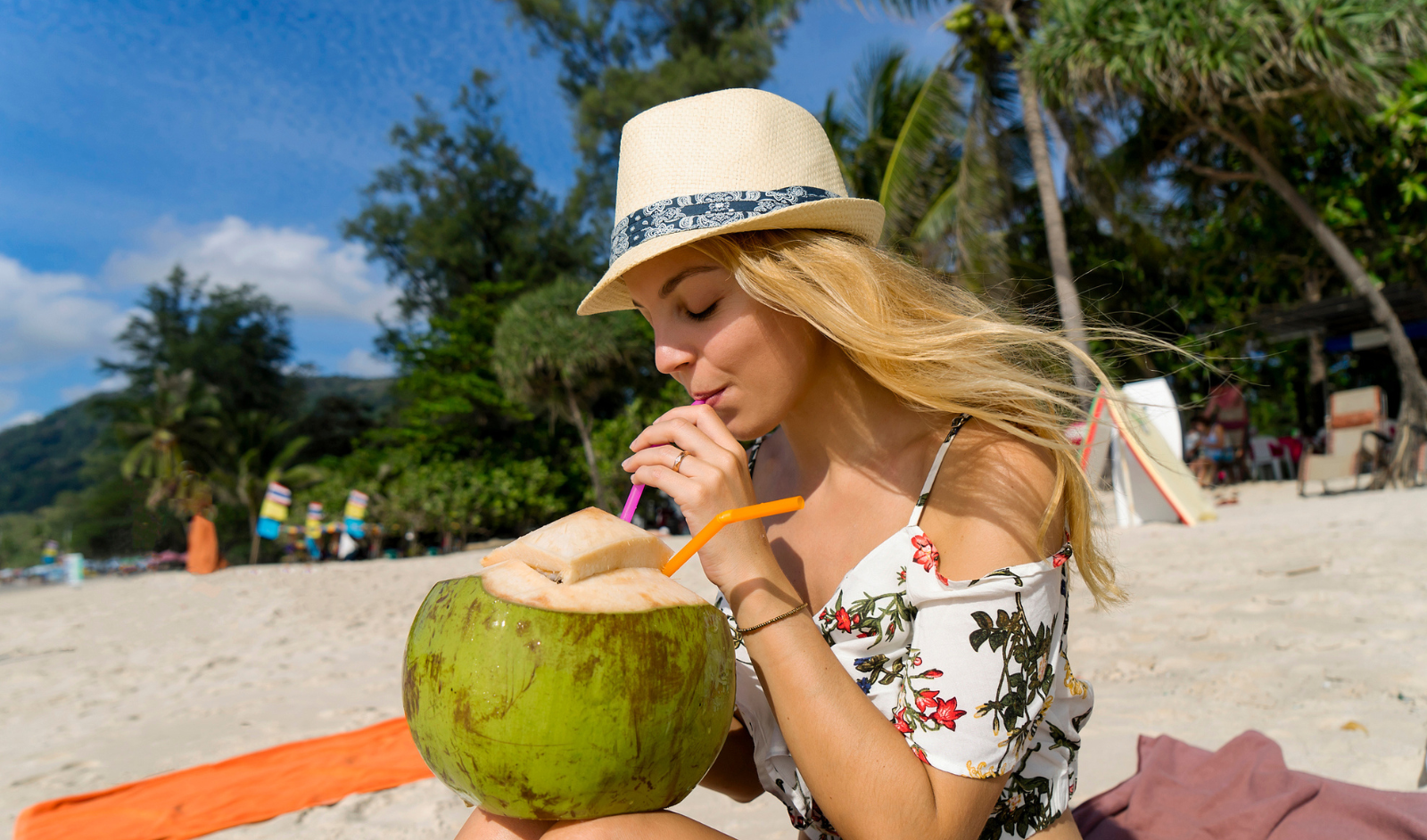Is Coconut Water Good For You?
We have a thirst for trendy drinks. Vitamin waters. Sports drinks. Exotic juices. And now, coconut water. It’s certainly refreshing, but is it really as healthy as the marketing campaigns suggest?

Coconut water (when pure and unflavored) is a clear liquid tapped from the center of coconuts. The only sugars it has are naturally occurring, just as fruit has naturally occurring sugar.
Is coconut water good for you? Well, if you’re trying to lose weight, tread carefully.
Certainly, coconut water is a far better choice than saturated-fat-rich coconut oil or coconut milk, but coconut water is liquid calories – about 45 calories per cup (8 ounces). If you do what some “experts” on the Internet and elsewhere suggest and guzzle coconut water before, during, and after your exercise workouts, the calories you burned during exercise may be cancelled out by the coconut water.
Your best bet for hydrating yourself, as always, is water. Pure, calorie-free water.
If your weight is fine and you’re engaged in intense physical activity, particularly workouts lasting more than one hour, coconut water can be used as fluid/electrolyte replacement. Just be careful that it’s pure coconut water you’re drinking, none of those chocolate, vanilla, or other flavor-added varieties popping up on supermarket shelves.
To make sure there’s no added sugar, sodium, or anything else in your coconut water, read the Ingredient List. All you want to see on the list is one ingredient – coconut water.
Check out the Nutrition Facts label, too. If you’re seeing more than 50 calories per 8-ounce serving, chances are sugar or another form of calories has been added.
Summing up: Is coconut water good for you?
Like all calorie-containing drinks, including fruit juices, coconut water would likely not be good for you, particularly if you’re trying to shed excess weight.
Tips For Before, During, and After Exercise
Here are basic Pritikin nutrition recommendations for before, during, and after exercise. They’re simple and, for most of us, very effective (and a lot cheaper than coconut water).

Learn More About Pritikin
-
Drink Water
Since our bodies are about 50 to 60% water, it is important to maintain this amount. A water loss of just 1 to 2% can decrease performance. It is not uncommon to lose 2 to 3% during typical exercise and activity, especially in hot environments. Because the Pritikin Eating Plan, full of fruits and vegetables, is so rich in water, you do not need to drink water before your workout, but while you’re exercising, we recommend you drink 8 to 10 ounces of water every 20 minutes. After exercise, drink 8 ounces for every half-pound of weight lost during your workout.
Proper hydration helps prevent fatigue, impaired cardiovascular function (blood pressure can be affected), and impaired temperature regulation (with less water in the body, sweating is compromised, which can lead to increased temperature).
“How do I know if I’m drinking enough?”
A good way to know that you’re hydrating properly is by checking the color of your urine. If it’s pale yellow, you’re well hydrated. If it’s darker, drink more.
-
Don’t Drink Too Much
Be careful not to drink too much water, called overhydration. It can lead to a problem called hyponatremia (low blood sodium). The Pritikin Eating Plan provides enough sodium for active individuals and also provides at least half of the water needed. Bottom line: Drink during and after exercise and other physical activities. At other times of the day, drink when thirsty.
-
Pritikin Eating Plan
For improving your exercise performance, the Pritikin Eating Plan, rich in unrefined, nutrient-packed carbohydrates, is ideal. It will also help you lose excess weight and keep it off, and attain overall optimal health.
When To Eat
To maintain a good energy supply for your body’s needs during exercise, eat at least three meals a day (even better is four or five smaller ones). Smaller, multiple meals throughout the day will assimilate nutrients better than one or two big meals.
Here are Pritikin eating recommendations for before, during, and after exercise:
-
Before exercise
Consume a small meal or snack, like a piece of fruit. You want your stomach feeling comfortable, not full. Choose carbohydrates; avoid excessive protein.
-
During exercise
Hydration is your main source of nutritional intake. If the duration of exercise exceeds one hour, we also recommend that you eat very small snacks, like fruit slices or vegetables, between bouts.
-
After exercise
Eating during recovery is key for refueling your muscles and maintaining normal blood sugar levels. Within 30 minutes after exercise, eat a small snack, such as vegetables or a fruit. Two to four hours after exercise, eat another snack or meal. Always remember that your nutrition today is your energy (glycogen) storage tomorrow.
